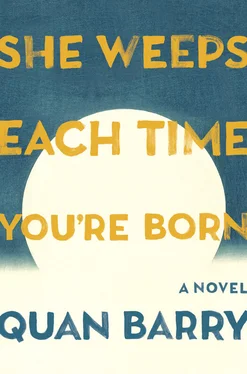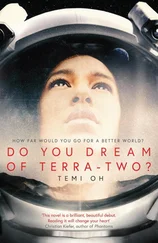Bà turned her head away so Huyen offered her the fruit directly. Painfully Bà lifted her head and took a bite. At the familiar sweetness, the seeds crunching between her teeth, she remembered the first time she’d ever eaten dragon fruit, the tree with its green arms armed with spikes.
It had happened at Terres Noires. The black earth. Bà’s breasts newly blossomed. She is standing behind the old wooden shed where the tin buckets are stored, each one rinsed out at the end of the day, the old women and children peeling the white residue from the sides and collecting the sticky peelings in a heap, which in turn will be measured and added to the day’s take. Thirty feet off someone is being beaten in the water station again, the sound of the victim’s voice familiar, something almost pleasurable in the man’s cries, though she cannot place it. The way his breath catches in his throat, the man gasping. An inexplicable burning grows in her loins as she listens to his agony.
Then she sees them. A pile of bright pink oblongs gleam on a table underneath a white tent. Everywhere there are acres of plates and silverware. She isn’t supposed to be standing here behind the shed where the tin buckets are stored when not in use. Her mother is out working the twelfth sector, bringing in her thirty pounds a day, which is easy in the twelfth sector because the trees are the ideal age. The white sap pouring out of them like tears.
And where is she now? A long communal building, a barracks. Things cluttered in the corners. Personal effects. Pots for cooking. Mats. It has been a long time since she has set foot in this world. Even with everyone out working in the sectors, the lingering smell of hundreds of unwashed bodies. He is sitting on a stool with his shirt off, a series of fresh welts running the length of his back. Is she still a child or was she ever a child? The man is older than her by whole lifetimes. Yet there is something about him that draws her to him. Perhaps it is the beauty of his hands, the skin of his palms like milk. Where is she and how did she come to this place? A room where she finds herself all alone with a shirtless man and his shredded body. But the man is winking at her. On the floor the sunlight pools in a yellow swatch. He is smiling as he reaches down inside his pants and pulls it out. She moves toward him. Pour vous , he says. Even when they had been beating him, he had managed to keep it tucked between his legs. The stolen fruit bright as a jewel.
Qui and Huyen stood and watched Bà toss in the cart. Together we unpeeled it, says Bà. The hunger of our hands, the black seeds crunching between my teeth. He takes his perfect milky palm and wipes the juice from my chin. Then he kisses me, our mouths full of dragon fruit.
Huyen could feel the headache stalling at the back of her brain. She had spit out the old leaves miles ago. Qui looked at her grandmother. I don’t know what she’s saying, Huyen said. It’s gibberish. They stood watching as the juice rolled down Bà’s chin. Finally she lay still. She’s dying, Huyen added. Qui didn’t even nod. Overhead a few of the small white seabirds floated in the blue, each one like a V in the sky. All right, Huyen said. Let’s go.
From the last hill leading into Nha Trang they could see a mass of boats in the port. People were in the water holding what looked like bundles over their heads, a small fleet already making their way out to sea. Later, Huyen would hear a rumor about an American battleship ten miles off the coast, and that if you could reach it, it would take you with them.
Late afternoon they came to a neighborhood. The highway was still another few miles east. They walked through deserted streets. Some of the houses had been dismantled, names and markings taken down, signs blacked out. Trash littered the ground. An old dog lay in an alleyway. As they wheeled by, it lifted its head and sniffed but didn’t get up. Something in the eyes — an animal weariness, as if it had seen this all before.
We should make the highway by sundown, said Huyen. She nodded toward the cart. People will help us. Somewhere she had picked up a large stick and was using it to make her way. Qui wondered where her grandmother had come into this newfound hope, this belief in people. Qui knew what would happen. She had seen it in the eyes of one of the Bana women when the man had offered Qui some of the fish. Overnight a thousand-year culture of hospitality had been reduced to every man for himself. The milky hollow in Qui’s chest was on fire. Who would help them? If things were different, she wasn’t even sure if she would help.
They walked on. A car shot past headed toward the highway, a sea of heads visible in the window, furniture and suitcases tied to the roof. As it sped by, Qui saw someone training a gun on them out the passenger-side window. It was a child, a young boy sitting in a woman’s lap, the boy’s face hard, his arm steady. The car continued on its way. Before the car reached wherever its destination was, Qui knew the boy would shoot somebody.
A man was standing in a doorway. It looked like it had been a shop of some kind. Through the window Qui could see the empty shelves. The man wasn’t wearing a shirt as he stood coolly smoking a cigarette. A handmade flag was tacked just above a window, the flag red with a single yellow star in the middle. It was probably something his wife had stitched up from rags. Qui wasn’t sure which one was prettier. The north’s solid red with the one yellow star or the southern flag of the Republic of Vietnam, three red stripes running horizontally in a field of yellow.
There were other people making their way to the highway. Many of them were traveling with carts and bicycles loaded with possessions. Occasionally a motorbike would speed past, or just as often someone would be pushing one, either out of gas or trying to conserve it. Everyone looked dirty and hungry but energized just the same. Qui tried to imagine what had happened in these streets in the first minutes when news of Buon Me Thuot hit, that the central highlands were falling. Qui knew that for many it was the beginning of a road without an end.
It took a while for her to notice that not everyone was fleeing. Qui saw a woman carrying a burlap sack of rice on her back. Two teenaged girls walked beside her, one with a proprietary hand on the sack. Both of the girls carried large sticks. They were walking the wrong way back up the street. The woman looked tired. Maybe she wasn’t ready to abandon her ancestors. Maybe in her mind she told herself she had nothing to fear, that she had never uttered a single word against the north, but her eyes said something else.
At the end of the street, Qui stopped and put down the cart. They had arrived at the boulevard that would take them to the highway. On one side of the street there were open-faced shops and small buildings, on the other side endless white sands and the aquamarine waters of paradise. Huyen looked at Qui. What, she said. Qui shook her head and picked up the cart again. Her hands were bleeding, the skin blistered and peeling. It would take too long to explain. Clouds of the small white birds sailed on the winds. She had never seen the ocean before.
It’s not too late, said Huyen. We could stop here. It was true. The world was fleeing without knowing exactly where, people pushing south as if just the word south could save them. Huyen traced the horizon with her eyes. The four of them could simply walk off the road, find an abandoned house, build a fire. In the early morning before sunup, she would take Qui out to the ocean, teach her to wade into the surf at low tide, throw a net. They were mountain people, but they could learn. Qui wiped her brow with a bloody hand.
A man and a woman meet in a barren landscape. The man is a dragon, the woman a fairy. Why they love each other we cannot say. What their congress looks like we do not know. In time the woman lays one hundred eggs, each one the soft pale color of mercy. There is joy and happiness followed by much sorrow as often occurs with pairings of this kind. Eventually the man and woman accept that they can no longer be together, their love poxed by the stars. The man is of earth, the woman water. She takes fifty of their children to the sea, he takes the others to the mountains. Such are the origins of the Vietnamese people .
Читать дальше












